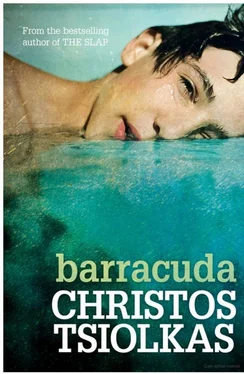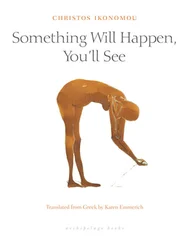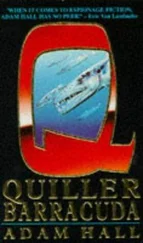‘It looks a lot like Melbourne.’
‘It does, doesn’t it? But it’s not Melbourne, it’s Glasgow and I’m going there.’
The flat planes of Dennis’s broad dark face creased in suspicion, and his brow furrowed. ‘When are you going?’
‘Not now. One day, I’ll be there one day.’
‘That’s alright.’ Dennis’s features relaxed. He let out a loud contented burp.
‘Charming.’
My cousin is a lot like me, thought Dan. Not now is enough, not now is all he needs. One day at a time.
He snapped the book shut. ‘Come on,’ he said, playfully shoving Dennis down the aisle. ‘It’s time to go home.’
MUM IS NATTERING AWAY AS WE cross the bridge over the river. She’s pointing out the Skipping Girl, the neon outline of the young girl with the skipping rope, and she’s reminiscing about how when she first moved to Melbourne, when she first got with Dad, he would take her down to the Yarra, past the Skipping Girl, past the firefighters’ training centre, and they’d walk hand in hand over the suspension bridge and into the woodlands and she thought it was the most romantic place she had ever seen.
‘All that parkland in the middle of the city,’ she’s saying. ‘Adelaide has parkland, but it isn’t such a gorgeous green. And back there!’
She turns to point behind us, and I panic, reach for the dashboard, yell, ‘Mum, watch where you’re going!’ but she is still blathering on about a little pub, back there, behind the factories in Burnley Street, where they would go dancing every Thursday night.
‘They played the best soul music, Danny, old rock and roll and rhythm and blues — I thought it was so wonderful. We’d get there on the dot of eight and we’d still be dancing when the lights were turned on at one a.m. Oh,’ she shivers, grabbing my knee, squeezing it tight, ‘I just danced and danced, and Adelaide and the Jehovahs and all that, I just imagined I was dancing away from it all. And I was!’
‘Uh-huh,’ I sigh. She’s told me this story so many times. About falling in love, with Dad, with Melbourne, with old R&B and soul. I look out the window, grab my sports bag. It’s got all my swimming gear in there and my toiletries and three changes of jocks and socks.
A few hundred metres past the bridge, we turn right and now the streets are wider and lined with huge trees. Their branches stretch out over the road, as though the branches are fingers reaching out to touch each other. The grey and the concrete and the towers of the city have disappeared, and as Mum negotiates a bend I can see the muddy river; beyond that, the office buildings and the skyscrapers look like toy models from here.
‘This is a pretty part of town,’ Mum says. She slows the car down, peering at the house numbers until she says, ‘That must be Mr Torma’s place.’
It seems weird to think of Coach having a life outside school, outside of us, the squad and our training. Until now I haven’t really considered that he would need a place to sleep, somewhere to live. I haven’t thought about him having a family or friends. I don’t reckon any of us have given a thought to him having a life outside the school, the pool, outside us .
It is a single-fronted red-brick terrace house, with green gables, a white picket gate with peeling paint and one missing slat. Concrete steps lead up to a solid door painted a metallic blue, and the paint there has also weathered; streaks of undercoat show through. There are a couple of rose bushes along the fence, wilted and untended, and a large crack that zigzags down the front of the house to the top of a large bay window. It’s not a grand house, but I like it immediately — it’s got old-fashioned elegance, and looks solid and permanent.
I go to kiss Mum quickly on the cheek.
‘Do you want me to come in, Danny?’ she asks.
I don’t want her to come in. I want to get into the house, to be with Coach and the boys, to focus on the competition in two days’ time. ‘Nah, Mum, I’ll be fine.’ I have one foot on the footpath, the other is still in the car. I am eager to get going.
But she’s clutching my hand. ‘Mate, I should be taking you to Adelaide, but you know it’s hard for me to go there?’
She holds my chin in her other hand, forcing me to look at her. I’m so impatient that I could just jerk my hand away from hers and wrench my head aside, but her eyes are so sad that I have to make myself not look away. I bring my foot back into the car and close my door.
‘By rights, you should be staying with your grandmother or my sister or my brothers, but it just isn’t meant to be, kid — I hope one day you’ll understand. I’m so sorry you don’t know your giagia , Danny, I’m so sorry about that.’
Is this what is making her so sad? I don’t mean to, but I have a big grin on my face. ‘I don’t mind, Mum. It’s OK.’
And it is OK. I don’t want to think about her family, that mad old bastard screaming in Greek at Mum, that scared old woman who wouldn’t let herself touch me. They aren’t family — they’re strangers I never want to see again.
But nothing I can say will take her sadness away. I just want to get out of the car. I want to be in the house, with Coach and my squad. ‘Can I go?’
‘Of course, Danny.’ She wraps me in one of those enormous hugs, where all I can do is let my body go floppy, just give in to it. I wait, and eventually she lets me go.
I wave goodbye to her, standing on the path. It is a relief when the car turns the corner and she is gone.
The ringer for the doorbell is a small white cube, and it hangs a little askew from the wiring. I press it. There is no sound so I press it again, and then I knock. There are lumbering sounds and then the door opens, and there is Coach. I have to take a step back. He is smiling, and just for an instant, a wrinkle in time, I don’t recognise him. It is the same heavy body, the same Bonds shirt and baggy shorts, but the smile has changed his face. I forget to say hello. But it doesn’t matter. He says, ‘Good to see you, Danny, come in, boy,’ and ushers me inside.
I am in Coach’s house.
I never notice houses, I realise now that I’ve never paid much attention to them. I know that our house is cramped and funny-looking, the sleep-out that Dad added when Theo was born is just tacked on to the laundry, and every room in our house is dark because all the windows are too small. Of course I’ve noticed the houses of my friends from school — their places are ginormous. I know that Luke’s house is modern, that his architect uncle designed it; I know that the Taylors’ house is a mansion and that Wilco’s is nearly a hundred years old. I know every part of Demet’s house; it has the same ill-begotten shape as ours. But wandering through Coach’s house, I have a dumb and childish thought and I stifle a giggle. It reminds me of Goldilocks: not too big, not too small — just right. I feel right in it. I feel at home.
The first thing I notice inside is the beauty of the ceilings. The Taylors’ houses have ceilings higher than this house, but they aren’t beautiful, I can’t remember anything about the ceilings of Martin’s houses at all, apart from their height. But the ceilings in Coach’s are sheets of rectangular reliefs, a sea of stuccoed ingots.
The front room, with the large window that looks out over the street, that window has a sill as deep as a seat, you could sit on it and watch the world go by. I can tell immediately that the front room is Coach’s bedroom. There is hardly anything in it, it’s really neat. There is a high bed with a double mattress, with shoes and slippers on the floor underneath it. There is a wardrobe with double doors; on one of them is a full-length mirror. There is a white chest of drawers next to the bed, and on it sits a digital clock and a photograph. It is of an old man and woman, their faces stern as they stare straight into the camera. The photograph is black and white but there is a faint copper wash through it. The woman is wearing a black scarf around her hair and the man wears a peculiar hat, like a cap without a visor. It is an olden — time photograph, the oldest photograph I have ever seen.
Читать дальше








